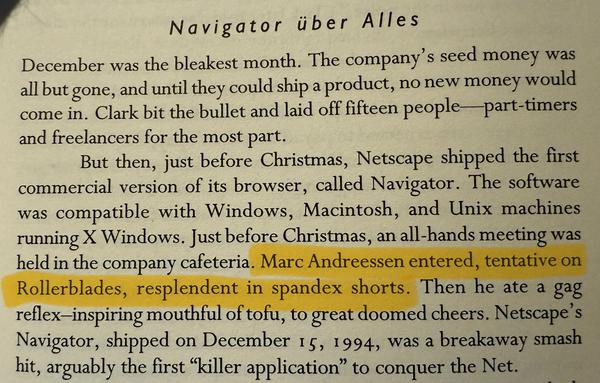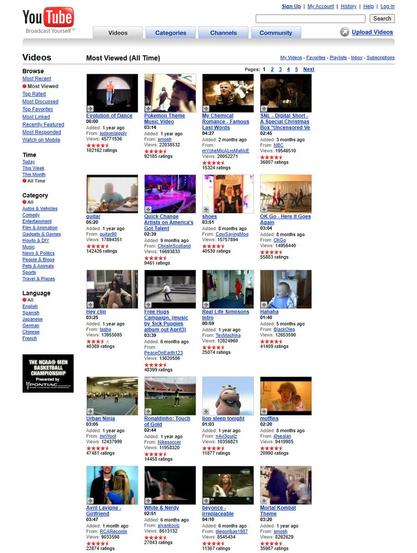The Conversation: The AI hype is just like the blockchain frenzy – here’s what happens when the hype dies . “In 2017, it was blockchain that promised to transform every industry. Companies added ‘blockchain’ to their name and watched stock prices skyrocket, regardless of whether the technology was actually used, or how. Now, a similar trend is emerging with AI. What’s unfolding is not […]
#InternetHistory
Internet Archive Blog: Keep on GIFin’ — A New Version of GifCities, Internet Archive’s GeoCities Animated GIF Search Engine!. “We are excited to announce a new version of GifCities, Internet Archive’s GeoCities Animated GIF Search Engine! GifCities was a special project of Internet Archive originally done as part of our 20th Anniversary in 2016 to highlight and celebrate fun aspects […]
In 1997, the first browser war began amid new internet trends like 'push' and DHTML. Meanwhile, instant messaging apps like ICQ and AIM became popular and GeoCities achieved 1 million users. cybercultural.com/p/internet-1... #InternetHistory
What the Internet Was Like in ...
In 1997, the first browser war began amid new internet trends like 'push' and DHTML. Meanwhile, instant messaging apps like ICQ and AIM became popular and GeoCities achieved 1 million users. https://cybercultural.com/p/internet-1997/ #InternetHistory
https://youtube.com/shorts/r-ToXvkQihs?si=IF2ZQ5hFywppouMv
Andrew Tate says Free Greta Thunberg
.
.
.
#AndrewTate #GretaThunberg #ViralMoments #InternetHistory #Controversy #SocialMedia #ClimateActivism #OnlineInfluence #LegalTroubles #2022Recap #InternetCulture #ViralTweets #SarcasmWins #InfluencerDrama #DigitalAge
A bit of Internet history for a change, in case there is somebody who may find this interesting!
The June edition of the monthly Golden Oldies Lyrics Quiz (GOLQ461) arrived into my mailbox this morning. It is also available on the web:
As in the past, the quiz consists of 25 regular tunes (all of which charted on the US Billboard pop chart between 1955 and 1969) and two tie-breakers. Entries are sent to the quiz masters by the end of the month and the results are published within a few days after that. Blind use of Internet search engines is strongly discouraged, as is posting the answers on public forums (including Mastodon!) before the end of the quiz.
All of the previous quizzes and their results are available on the GOLQ web site at http://golq.org/, which is a great resource, if you have any interest in testing your knowledge of the 1950s and 1960s popular music. Already in the 1990s, GOLQ was known as the longest-running Internet music quiz, and since it's still around, I'm pretty sure that this is the case even today. Originally posted to the Usenet newsgroups rec.games.trivia and alt.rock-n-roll.oldies, the quiz was started by Rick Schubert back in 1990. Soon, a number of other quiz masters joined him, established a three-week rotation (later extended to one month) and created a detailed set of rules and guidelines for the quiz.
I found out about the quiz in 1993, and starting with GOLQ76, ended up being a member of the quiz master team. All of the original quiz masters had been from the US, but another fellow Finn, Tommi Uschanov (who I had met through alt.rock-n-roll.oldies) had joined the team a little before me. Although there was a lot of work in running these quizzes, it was also great fun.
The popularity of the quizzes peaked in the mid-to-late 1990s, the record number of entries being more than forty. Although there were never any prizes, the top teams put a lot of effort into identifying as many of the songs as possible. I certainly learned a lot both as an entrant and as a quiz master.
The quiz was an integral part of the alt.rock-n-roll.oldies newsgroup, which was later supplanted by the rec.music.rock-pop-r+b.1950s, .1960s and .1970s groups. In addition to the Usenet discussions, there was also quite a bit of other communication and collaboration between the quiz masters and some of the newsgroup regulars - we did tape trades, and one of the quiz masters, Barry Silk, established the Mystery Oldies Audio Quiz (MOAQ), which consisted of 125 songs, was much more difficult and was distributed on cassette tapes sent by mail to a smaller insider group of participants. One of the high points of this period for me was that I also got to run one of the MOAQs with a friend of mine.
Unfortunately (from the GOLQ perspective, at least) the Internet search engines were getting better over time, and by the end of the 1990s it was clear that you could get many of the GOLQ answers simply by putting a snippet of the lyrics into an AltaVista or Google search box. Perhaps because of this, the popularity of the GOLQs started to wane. The decline of the Usenet newsgroup communities was probably another reason for the loss of participants. We tried to overcome this by doing some of the GOLQs as MOAQ-like audio quizzes, which did work to some extent, at least for a time.
I finally dropped out of the quiz master team in 2003, as there were other things in my life that were taking up my time. But it's nice to know that the quiz is still going on, with several familiar names from the old days associated with it. I have continued to be on the GOLQ mailing list and have sometimes tried to identify the songs in the latest quiz, usually just for my own pleasure.
#GOLQ #oldies #quizzes #Usenet #music #internethistory #popcharts #1950s #1960s #songlyrics
Remember those "best experienced with [browser name]" badges?
"MTV's revamped World Wide Web site for MTV contains a heavy amount of original music content and a unique Web browser design. [...] Some of the site's best content, including a grossly appealing game with Beavis & Butt-head, is designed exclusively for Microsoft's Internet Explorer browser."
https://cybercultural.com/p/browser-war-1990s/
#internet #TheWeb #InternetHistory #technology #cyberculture
"I want my MTV...as long as it's the Java version in IE4."
MTV's website in 1997 was a hodgepodge of technologies: Java, JavaScript, frames and more. The quality of your user experience depended on which browser you used: Netscape or IE. cybercultural.com/p/browser-wa... #InternetHistory
Best Experienced With: MTV.com...
"I want my MTV...as long as it's the Java version in IE4."
MTV's website in 1997 was a hodgepodge of technologies: Java, JavaScript, frames and more. The quality of your user experience depended on which browser you used: Netscape or IE. https://cybercultural.com/p/browser-war-1990s/ #InternetHistory #BrowserWar
In today's groundbreaking exposé on the #Renaissance, we've uncovered the shocking truth: it requires #JavaScript and #cookies to contemplate! 🍪🔄 Clearly, the real art here is figuring out how to enable the internet of the past. 🎨🖥️
https://www.chronicle.com/article/how-should-we-think-about-the-renaissance #InternetHistory #WebArt #HackerNews #ngated
Now this is a detail I hadn’t known about the launch of Netscape Navigator in December 1994. From ‘Speeding the Net’, a 1998 book about Netscape by Quittner and Slatalla. #InternetHistory
Flash Back: An "oral" history of Flash
https://goodinternetmagazine.com/oral-history-of-flash/
#HackerNews #FlashBack #OralHistory #Flash #Technology #InternetHistory #GoodInternetMagazine
I look back on the 3 musketeers of web design in the 1990s: Jeffrey Zeldman, David Siegel, and Jakob Nielsen. Each had a distinct web design philosophy (and if you read till the end, you'll discover which one I believe 'won' in the long term). I focus in particular on 1997, which is when Flash and CSS emerged. But I also look back on the careers of the 3 gurus from our 2025 perspective. https://cybercultural.com/p/web-design-1997/ #InternetHistory #WebDesign
Cory Doctorow on how we lost the internet
https://lwn.net/SubscriberLink/1021871/4bec46993258f6b7/
#HackerNews #CoryDoctorow #LostTheInternet #InternetHistory #DigitalRights #TechnologyDiscussion
A neat bit of Internet history:
512K Day: The Day The Internet (almost) Broke
From Hosts.txt to Modern Internet Infrastructure
https://axonshield.com/from-hoststxt-to-modern-internet-infrastructure
#HackerNews #HostsTxt #ModernInfrastructure #InternetHistory #TechEvolution #Cybersecurity
RT by @SwiftOnSecurity: Most viewed videos on YouTube in 2007
🐦🔗: https://nitter.oksocial.net/WebDesignMuseum/status/1925167996152033696#m
[2025/05/21 12:33]
During 1997, video streaming came to web browsers through plug-ins like RealVideo, VDOLive and Microsoft's NetShow. David Bowie even attempted to 'cybercast' one of his concerts that year. #InternetHistory #VideoStreaming #U2
https://cybercultural.com/p/video-streaming-1997/?utm_source=flipboard&utm_medium=activitypub
Posted into INTERNET HISTORY @internet-history-ricmac
Back in 1997, the browser plugin RealPlayer became synonymous with "buffering" — constant, annoying delays in streaming a video online. But the buffering epidemic didn't dampen the HYPE for online video that year. And you thought AI hype was bad... cybercultural.com/p/video-stre... #InternetHistory
The Age of Buffering: Video St...
Back in 1997, the browser plugin RealPlayer became synonymous with "buffering" — which for 90s web users meant constant, annoying delays in streaming a video online (usually over dial-up). Funnily enough though, the buffering epidemic didn't dampen the HYPE for online video streaming that year. Wired magazine even declared that RealVideo was leading a “war with TV.” And you thought AI hype was bad... https://cybercultural.com/p/video-streaming-1997/ #InternetHistory #VideoStreaming

